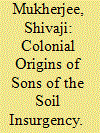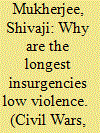| Srl | Item |
| 1 |
ID:
162444


|
|
|
|
|
| Summary/Abstract |
What are the long-term effects of colonial institutions on insurgency? My article shows the historical origins of insurgency by addressing the puzzle of why the persistent Maoist insurgency, considered to be India’s biggest internal security threat, affects some districts along the central eastern corridor of India but not others. Combining archival and interview data from fieldwork in Maoist zones with an original district-level quantitative data set, I demonstrate that different types of British colonial indirect rule set up the structural conditions of ethnic inequality and state weakness that facilitate emergence of Maoist control. I address the issue of selection bias, by developing a new instrument for the British choice of indirect rule through princely states, based on the exogenous effect of wars in Europe on British decisions in India. This article reconceptualizes colonial indirect rule and also presents new data on rebel control and precolonial rebellions.
|
|
|
|
|
|
|
|
|
|
|
|
|
|
|
|
| 2 |
ID:
182422


|
|
|
|
|
| Summary/Abstract |
What is the role of colonial institutions in creating the conditions for nativist sons of the soil (SoS) insurgency? The literature on sons of the soil conflicts has not explored the historical legacies of colonial institutions, nor has it sufficiently analyzed how land tenure institutions create sons of the soil conflict. I address these gaps, by proposing a theory of how British colonial indirect rule and land tenure institutions in India caused exploitation of land resources of indigenous tribes by ethnic outsiders, which caused SoS grievances that persisted through path dependence and were later mobilized by Maoist rebels in the former princely state of Bastar in Central India. I show generalizability of this mechanism to other cases of leftist insurgency in Colombia, Mexico and Philippines.
|
|
|
|
|
|
|
|
|
|
|
|
|
|
|
|
| 3 |
ID:
133580


|
|
|
|
|
| Publication |
2014.
|
| Summary/Abstract |
There is a puzzle yet unanswered by theorists of civil war - why are the longest insurgencies low levels of violence? I argue that medium capacity states with multiple insurgencies tend to choose a counter insurgency strategy of containment vis-à-vis peripheral sons of the soil insurgencies, causing them to become stalemated low scale conflicts. While the current literature focuses on commitment problems, or low state capacity to explain such persistent low intensity insurgencies, my theory suggests that central politicians of these medium capacity states try to follow a policy of containment, particularly vis-à-vis the peripheral ethnic 'sons of the soil' insurgencies which are of low priority in terms of threat to political survival of these central politicians. The theory is tested on the Fearon (2004) data-set, and shows that those medium capacity states with multiple conflicts and sons of the soil insurgencies tend to have these low intensity long lasting insurgencies. This paper contributes to the literature on civil war duration, and also to the literature on sons of the soil conflicts. It investigates the different conditions under which state elites do not have sufficient incentives to try and eliminate rebels, because it is unacceptably costly to do so.
|
|
|
|
|
|
|
|
|
|
|
|
|
|
|
|